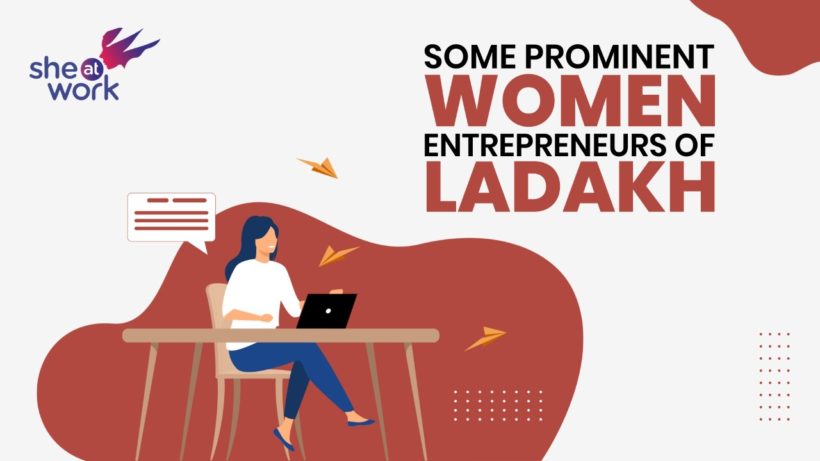We got familiar with the beauty of Ladakh when we ere exposed to the Bollywood film ‘3 Idiots’. Actually this put the spotlight on Ladakh by drawing evryone’s attention to the region’s natural beauty, which is beyond description. The finest ‘Pashmina wool in the world comes from Ladakh; and today, Ladakh has become a trekkers’ dream and the destination of many mountain lovers, because of its beautiful mountains and deep, snowy, silent valleys. The greatest industry of this region is obviously tourism and the number of tourists that flock to this Himalayan region, may have catapulted many times, thanks to that film.
Coming to the progressive movement happening here, major initiatives are in full swing – to foster entrepreneurship; and most importantly, it encourages youngsters to innovate on projects that may be specific to Ladakh or the entire Himalayan region.
We present some enterprising women entrepreneurs from the beautiful region of Ladakh.
> Thinlas Chorol, Co-founder, Ladakhi’s Women Travel Company
It was in 2009, that Thinlas Chorol co-founded Ladakhi’s Women Travel Company. She is a social entrepreneur and writer from Ladakh, and is truly a determined Ladakhi woman, who was all focussed on establishing her new business. In fact, this also exemplifies the traditional
equality and strength of Ladakhi women.
What she does now, is – teaching women in the leadership position she is in. When she was a freelance trekking guide herself, she observed in the community that many Ladakhi women were interested in becoming guides. This is the startup they formed, slowly and steadily stepped into this area – to empower people. They help women in teaching leadership so they become confident and strong. This is pertinent because the team at Ladakhi Women’s Travel Company consists completely of women.
> Ms. Sonam Angmo and Ms. Stanzin Minglak, Co-founders, Lena
After completing their Masters in Delhi & Pune Universities, Ms. Sonam Angmo and Ms. Stanzin Minglak, returned to Ladakh and created their start-up in 2016 with 11 women initially. Their growth is an inspiring empowerment journey that led to an international brand label called – Lena. It is indeed, a grand success story. Today Lena helps to create sustainable and dignified source of livelihood for many women artisans of Ladakh, and at the same time, produces pure handmade Pashmina textiles, that identifies Ladakh. Currently, Lena has emerged as a Ladakh- based textile brand label that crafts Pashmina products.
> Smt. Nilza Wangmo from Leh, Founder of Alichi Kitchen
It was in 2016, that Nilza Wangmo started a business called “Alchi Kitchen”, after getting a business loan. The restaurant was situated just above their home and the offerings were so good that it attracted tourists to trek and find her restaurant! After leading a tough life, she firmly believed that the food from her home region would appeal to visitors. They were different from other restaurants that served more traditional cuisine (fearing that the local food tradition would be seen as too bland). So, she and her mother developed the menu that consists of a local pasta-like product called Chutangi and the Momos; plus tea based on apricot kernels and their own special blend are served too. The diners sit around a wood-fired oven and watch the cooks create their meal – which is an experience by itself!
In 2019, her food was appreciated and she went on to extend her business by teaching others about how to cook “her” cuisine. Her work in 2019 was recognised and she bagged the highest award for women in India. Celebrating International Women’s Day in 2020 she was amongst fifteen women who were given the Nari Shakti Puraskar award by President Shri Ram Nath Kovind.
> Rigzin Angmo, Rigzin Yangdol, Padma Angmo and Padma Angmo – Co-founders, Kangla Nyishar (Nima Goos Goos )
It was in September 2018, Rigzin Angmo met three friends who would a year later join her as co-founders of Kangla-Nyishar – which translates into ‘sunflower’ in Ladakhi. The Leh-based startup makes artisanal food with locally-sourced organic produce that benefit small growers, producers and the local economy.
They source their raw materials from local farmers and make products like three varieties of pesto—walnut, apricot and sun-dried tomato—and buckwheat tea.
What brought them together was the Naropa Fellowship programme, which was a one-year course focussed on creating “agents of change” working towards “fostering an ecosystem of entrepreneurship and growth” while preserving the “heritage of Ladakh” and the larger Himalayan region. And, what helped was that as part of the programme, students were required to come up with an idea for a business venture and the means of developing it. So, backed by a strong desire to discover and launch indigenous products that were fully representative of Ladakh, the four women felt that a venture most likely to succeed would be one which maintains a close relationship with the land and local community.
As a result of COVID, they couldn’t launch in a major way. They got into rebranding, and they were in the process of changing the business’s name from Kangla-Nyishar to Nima Goos Goos, which they felt registers better in the minds of customers outside Ladakh. Nima Goos Goos is also another name for ‘sunflowers’ in Ladakhi.
> Juhi Lakhwani, Co-founder, Lugu Ladakh
Juhi Lakhwani, a textile design graduate from Srishti Institute of Art, Design and Technology, Bengaluru, is also a Naropa Fellow. Being part of the first batch, she co-founded a venture called Lugu Ladakh that aims to find a market both within the country and outside – for beautiful, hand-woven Ladakh carpets called Tsukdan in Ladakhi. These carpets are fully hand-spun with natural wool, that is used by a nomadic tribe in a place called Changthang – to insulate their homes for winter. After receiving the orders, she contacts the artisans, who start work and deliver the carpets after they are ready.
With her textile design qualification, she hopes to intervene in the design of the carpets, after
she and her co-founder Nishit Sangomla have established a market for them. She is convinced
that there is a global market for these carpets and they hope to tap it too.
> Opening up Homestay Options
With tourists getting attracted in a major way to this region, women in a village in Ladakh are slowly coming into their own as homestay hosts. Another factor that added to this was that many of the men work in the Army and stay away from home for months. So, opening their picturesque homes for tourists has been the way towards empowerment, both social and financial, for women in Ladakh’s Phyang village. What is specially meaningful is that these women worked totally ‘unseen and unheard’ wearing many hats like – a cook, a cleaner and farm worker too. But now, they are finding new confidence as mini-entrepreneurs.
So, we have Tsering who has a traditional Ladakhi home. In the five rooms, two have been kept by the family and the rest have been registered on Airbnb. The online travel portal has tied up with the non-profit organisation – Self Employed Women’s Association of India (SEWA) for Hum Sab Ek, an initiative that is looking at empowering women to become micro-entrepreneurs by helping them turn into homestay hosts. In fact, as part of this SEWA-Airbnb partnership, 10 homes in Phyang village have been listed on the travel portal, and the number is expected to increase.
Like Tsering, another person got into turning homestay host. This has opened windows for Tsewang Dolma, (who is a widow) who had spent much of her life being dependent on first her father, then her husband. But when her husband died, she tried to monetise the one skill she had – cooking, but did not get her much earnings either. Life would have continued in much the same manner had it not been for the SEWA-Airbnb Hum Sab Ek initiative that had an impact on her life.
Another woman who entered this world, is Chery Dolker, who has also found a new mission with Hum Sab Ek. After a difficult life during childhood and later too, she (who was a Nepali by birth, and adopted by a Ladakhi couple) always dreamed of achieveing something solely by herself. The family that went through tough times, had a two floor house with a lovely garden patch in the front where fruits and vegetables of all kinds are grown. The produce sold in the Leh market was the family’s primary source of income. This proved to start a success story that she initiated.










